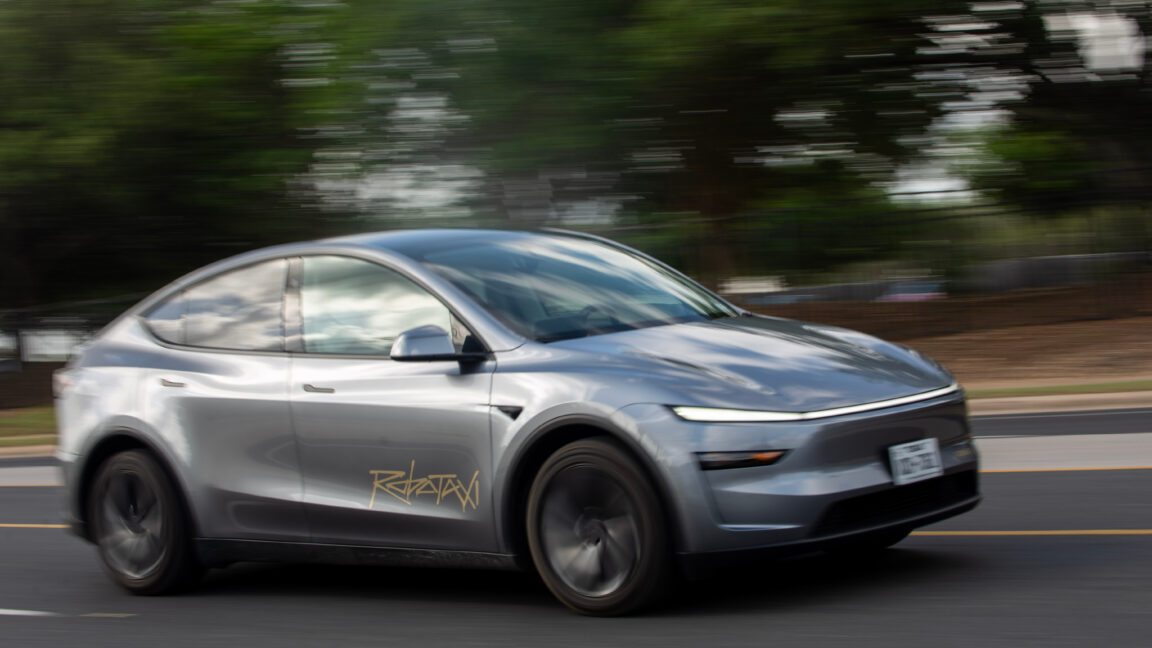
Credit: Tim Goessman/Bloomberg via Getty Images
Tesla’s eroding popularity with Americans shows little sign of abating. Each month, the Electric Vehicle Intelligence Report surveys thousands of consumers to gauge attitudes on EV adoption, autonomous driving, and the automakers that are developing those technologies. Toyota, which only recently started selling enough EVs to be included in the survey, currently has the highest net-positive score and the highest “view intensity score”—the percentage of consumers who have a very positive view of a brand minus the ones who have a very negative view—despite selling just a fairly lackluster EV to date. Meanwhile, the brand that actually popularized the EV, moving it from compliance car and milk float to something desirable, has fallen even further into negative territory in July.
Just 26 percent of survey participants still have a somewhat or very positive view of Tesla. But 39 percent have a somewhat or very negative view of the company, with just 14 percent being unfamiliar or having no opinion. That’s a net positive view of -13, but Tesla’s view intensity score is -16, meaning a lot more people really don’t like the company compared to the ones who really do. The problem is also growing over time: In April, Tesla still had a net positive view of -7.
Tesla remained at the bottom of the charts when EVIR looked more closely into demographic data. Tesla was the least-positively viewed car company regardless of income, although the effect was most pronounced among those with incomes less than $75,000, as were the results based on geography (although suburbanites held it in the most disdain) and age (where those over 65 have the most haters).
Vinfast is the only other automaker with a negative net-positive view and view intensity score, but 92 percent of survey respondents were unfamiliar with the Vietnamese automaker or had no opinion about it.
When asked which brands they trusted, the survey data mostly mirrored the positive versus negative brand perception. Only Tesla and Vinfast have negative net trust scores, with Tesla also having the lowest “trust integrity score”—those who say they trust a brand “a lot” versus those who distrust that brand “a lot,” at -19.
At least Elon Musk’s car company can avoid the ignominy of coming last in perceptions of each EV brand’s safety. Musk regularly touted misleading statistics to create an image of a car company with unparalleled safety. But after dozens of fatal crashes involving Teslas, frequently with the involvement of the company’s often-investigated driver assistance systems, it seems much of the public has actually been paying attention. But just 52 percent think of Teslas as safe, the second-worst score (yes, after Vinfast).
Robotaxi rollout was a bust
EVIR also investigated attitudes toward AVs and robotaxis. Only 1 percent of the more than 8,000 people surveyed had ridden in a robotaxi and would do it again, the same percentage that would not care to repeat the experience. More than twice as many people (46 percent) say they would never consider riding in a robotaxi than say they would consider it (21 percent). And more than half somewhat (22 percent) or strongly (31 percent) believe the technology should not be legal.
Robotaxis have been important to Tesla for some time now. Forget making money by selling cars—instead for several years now Musk has told us the future of Tesla is humanoid robots doing manual labor and a giant fleet of robotaxis driving the streets, making every other car brand irrelevant. Austin, Texas, was to be ground zero for the Tesla robotaxi, thanks to a highly liberal attitude by conservative lawmakers toward private companies experimenting on public roads there.
But just under two-thirds (65 percent) of those surveyed by EVIR were unaware that Tesla had started demoing its autonomous vehicles in the city starting in late June. Only 3 percent considered themselves well-informed.
That lucrative autonomous future starts to look a little less likely once those survey respondents were given an excerpt of an article from The Wall Street Journal about the robotaxi rollout. The article included information that will be familiar to readers of Ars Technica, including the fact that Tesla relies on a camera-only system that can be blinded by sunlight, and after reading it, half of those surveyed said they were somewhat or much less interested in using a Tesla robotaxi. Even more—53 percent—were somewhat or much less convinced that Tesla’s robotaxis are safe.
And there’s little worse for an automaker than being perceived as unsafe.

-
 C114 Communication Network
C114 Communication Network -
 Communication Home
Communication Home


